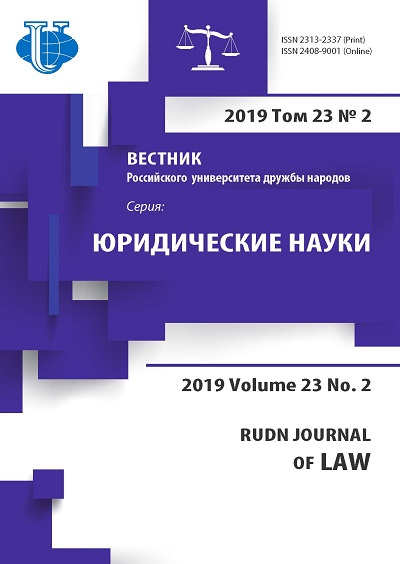МОДЕРНИЗАЦИЯ КОНСТИТУЦИИ РОССИИ (К ИТОГАМ ОБСУЖДЕНИЯ В СВЯЗИ С 25-ЛЕТИЕМ)
- Авторы: Власенко Н.А.1
-
Учреждения:
- Российский университет дружбы народов
- Выпуск: Том 23, № 2 (2019)
- Страницы: 163-183
- Раздел: КОНСТИТУЦИОННОЕ ПРАВО
- URL: https://journals.rudn.ru/law/article/view/21539
- DOI: https://doi.org/10.22363/2313-2337-2019-23-2-163-183
- ID: 21539
Цитировать
Полный текст
Аннотация
Прошло четверть века с момента принятия Конституции Российской Федерации всенародным референдумом. Юбилей дает повод порассуждать об оптимальности конституционных положений, их эффективности, а где-то и практической целесообразности. В статье поставлена задача проанализировать высказанные в этой связи точки зрения в научной печати, газетной периодике и других средствах массовой информации. Однако прежде автор уделяет внимание истории появления Конституции РФ 1993 года. Отмечается, что Основной Закон, с одной стороны, явился военно-политическим компромиссом между сторонниками парламентского видения устройства страны в будущем и сторонниками сильной президентской власти, с другой стороны, позволил полностью распрощаться с советскими строем и традициями. Данная ситуация и фактор торопливости, спешности не могли не повлиять на содержательное и технико-юридическое качество документа. Высказанные мнения по вопросу модернизации Конституции России автор свел к трем позициям: 1) Конституция не исчерпала своих возможностей, и трогать ее текст нет оснований; 2) необходима полноценная конституционная реформа, действующая Конституция свой потенциал исчерпала; 3) необходимы «точечные» изменения и дополнения, способные улучшить Конституцию. В статье аргументируется, что последняя позиция так называемых точечных изменений - наиболее продуктивна и позволяет конституционный документ сделать адекватным и актуальным. В этой связи на первоначальном этапе предлагается провести несколько «круглых столов» по вопросу выработки концепций совершенствования конституционных основ. Одну из них автор называет перспективной и предлагает подготовить перечень предложений по изъятию идеологически и фактически не подтвердивших себя в практической жизни положений. Речь идет о правовом государстве (исключая принцип разделения государственной власти), социальном государстве и т.д. Другую концепцию, которую также необходимо разработать, - это институциональную (концепцию статуса властей, их полномочий и баланса и др.). Данные идеи, считает автор, должны быть компромиссом между учеными, затем стать достоянием общественности и реализовываться в прак-тику конституционного строительства.
Об авторах
Николай Александрович Власенко
Российский университет дружбы народов
Автор, ответственный за переписку.
Email: vlasenko-na@rudn.ru
доктор юридических наук, профессор, профессор кафедры теории права и государства Юридического института Российского университета дружбы народов, заслуженный юрист Российской Федерации
117198, Москва, Россия, ул. Миклухо-Маклая, д. 6Список литературы
- Алексеев С.С. У истоков Конституции России. Субъективные заметки. Екатеринбург. 2009. 42 с
- Алексеев С.С. Философия права. М., 1998. С. 309-310
- Барциц И.Н. Конституционный дизайн (о красоте и эстетике конституций) // Вестник Пермского университета. Юридические науки. 2018. Выпуск. 41. C. 344-370. doi: 10.17072/1995-4190-2018-41-344-370
- Бондарь Н.С. Стратегия российского конституционализма: от политических иллюзий к правовому реализму // Журнал российского права. 2015. № 11. C. 5-18
- Черданцев А.Ф. Интегративное недопонимание права. Журнал российского права. № 10. 2016. С. 8-15. (in Russian)
- Черданцев А.Ф. Теория государства и права. М., 1999. С. 162-164
- Dakolias, M. (2010), Are We There Yet?: Measuring Success of Constitutional Reform. VANDERBILT JOURNAL OF TRANSNATIONAL LAW Vol. 39:1117. (in English)
- Денисов С.А. Имитация конституционного строя. Книга 1. Екатеринбург. 2018. С. 75
- Elkins, Z., Ginsburg, T. Blount, J. (2011), Constitutional Reform in the English-Speaking Caribbean: Challenges and Prospects. A report prepared for the Conflict Prevention and Peace Forum. 20 pp. (in English).
- Гоголевский А.В. Русский конституционализм: от самодержавия к конституционно-парламентской монархии. М. 2001. 490 c.
- Изензее И., Кирххоф П. Государственное право Германии. В 2-х томах. Том 1. М., 1994. С. 32
- Jones, R. (2013), Constitutional Reform and the Contribution of the Political Parties since the Beginning of the 20th Century. MANCHESTER STUDENT LAW REVIEW. Vol 2:110. 110-147 pp. (in English.)
- Keating, M. (2009), Second Round Reform. Devolution and constitutional reform in the United Kingdom, Spain and Italy. LSE’ Europe in Question’ Discussion Paper Series. (15). European University Institute, Florence. (in English)
- Хабриева Т.Я., Андриченко Л.В. Конституционные реформы на постсоветском пространстве: тенденции развития // Вестник Пермского университета. Юридические науки. 2017. Вып. 37. C. 272-287
- Хабриева Т.Я. Конституционные реформы в современном мире. Вестник Российской Академии Наук. 2016. Т. 86, в. 4. 269-275 с
- Клишас А.А., Еремян В.В. Конституция 1993 как новый этап демократизации Российской государственности. М., 2014. С. 4
- Корнев В.Н. Интегративная природа Конституции России. Российское правосудие. № 12. 2019. С. 8-15
- Лукьянова Е.А. Конституционные риски. М. 2015. С. 28
- Масловская Т.С. Новые направления конституционных реформ в зарубежных странах (динамика последних пяти лет) // Журнал зарубежного законодательства и сравнительного правоведения. № 4. 2016. С. 82-87
- Mbondenyi, M.K. Ojienda, T. (2013), Constitutionalism and Democratic Governance in Africa: Contemporary Perspectives from Sub-Saharan Africa. University of Pretoria. p. 395. (in English)
- Овчинникова О.Д., Шаганян А.М. Юридические обязанности через призму теоретико-правового анализа положений Конституции Российской Федерации. Вестник Томского государственного университета. Право. 2018. № 27
- Румянцев О.Г. О 25-летии Конституции Российской Федерации и новом номере «Конституционного вестника». Конституционный вестник. 2019. № 4, 284-294 с. (22)
- Умнова (Конюхова) И.А. Новые тенденции и особенности применения Конституции РФ российскими судами. В сб. применение национальных конституций в Российской Федерации и Франции: сравнительно-правовой аспект. Под ред. Фроловой И.А. М., 2015. С. 51-59
- Зенкин С.А. Модернизация Конституции Российской Федерации: нормативная модель и практика. 2018. № 11 (144)
Дополнительные файлы















